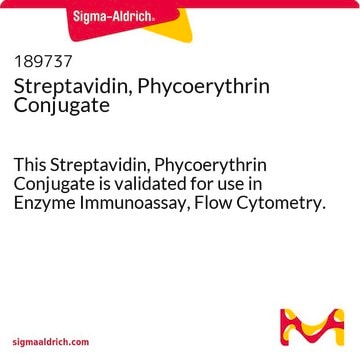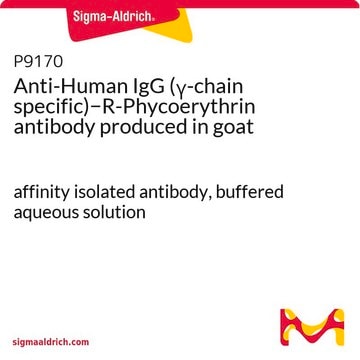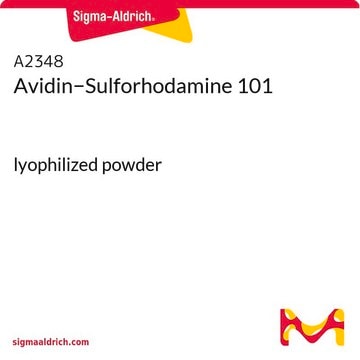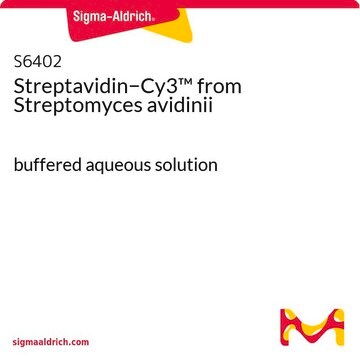42250
Streptavidin-R-Phycoerythrin
≥1 mg/mL (active substance)
Sign Into View Organizational & Contract Pricing
All Photos(1)
About This Item
UNSPSC Code:
12352108
NACRES:
NA.32
Recommended Products
form
liquid
Quality Level
concentration
≥1 mg/mL (active substance)
fluorescence
λex 566 nm; λem 576 nm in 0.1 M phosphate pH 7.0
storage temp.
2-8°C
General description
Streptavidin-R-Phycoerythrin is a fluorescent labeling agent comprised of a biotin-binding protein (streptavidin) covalently attached to a fluorescent label ((R-phycoerythrin). Streptavidin-R-phycoerythrin complexes provide the measurement method for the target phosphoprotein. And, Streptavidin R-phycoerythrin extends the light tolerance of certain phycobiliproteins.
Application
Streptavidin-R-Phycoerythrin (R-PE) is used to label biotin-conjugated (biotinylated) molecules and biotin derivatized surfaces in a wide variety of immunofluorescence applications such as immunochemistry and histochemistry. Streptavidin-R-Phycoerythrin may be used in the development of bioassay devices such as Lab-on-a-chip (LoC) systems and microarrays.
Legal Information
Geniom is a registered trademark of Febit Biotech GmbH
Storage Class Code
12 - Non Combustible Liquids
WGK
WGK 1
Flash Point(F)
Not applicable
Flash Point(C)
Not applicable
Choose from one of the most recent versions:
Already Own This Product?
Find documentation for the products that you have recently purchased in the Document Library.
Customers Also Viewed
Yusheng Zhu et al.
Clinical chemistry, 52(6), 1033-1039 (2006-03-25)
Genotyping of N-acetyltransferase-2 (NAT2) is useful in predicting the risk for toxicity of NAT2 substrates. Current methods cannot detect the 7 most important single-nucleotide variations in NAT2 simultaneously in 1 tube. We developed an assay that uses allele-specific primer extension
Min Sun et al.
Steroids, 75(13-14), 1089-1096 (2010-07-27)
The small blood volumes available in rodent studies often limit adequate quantification of all hormones of interest. We report here the development of two new assays combining an extraction step with multiplex immunoassay (MIA) technology for the simultaneous determination of
Marion Ritzi-Lehnert et al.
Biomedical microdevices, 13(5), 819-827 (2011-05-24)
Point-of-care (PoC) testing followed by personalized efficient therapy of infectious diseases may result in a considerable reduction of associated health care costs. Lab-on-a-chip (LoC) systems represent a potentially high efficient class of PoC tools. Here, we present a LoC system
Valérie Briand et al.
Malaria journal, 19(1), 188-188 (2020-05-26)
While sub-microscopic malarial infections are frequent and potentially deleterious during pregnancy, routine molecular detection is still not feasible. This study aimed to assess the performance of a Histidine Rich Protein 2 (HRP2)-based ultrasensitive rapid diagnostic test (uRDT, Alere Malaria Ag
Adam Stewart et al.
Methods in molecular biology (Clifton, N.J.), 1636, 119-131 (2017-07-22)
The study of protein phosphorylation is critical for the advancement of our understanding of cellular responses to external and internal stimuli. Phosphorylation, the addition of phosphate groups, most often occurs on serine, threonine, or tyrosine residues due to the action
Our team of scientists has experience in all areas of research including Life Science, Material Science, Chemical Synthesis, Chromatography, Analytical and many others.
Contact Technical Service










